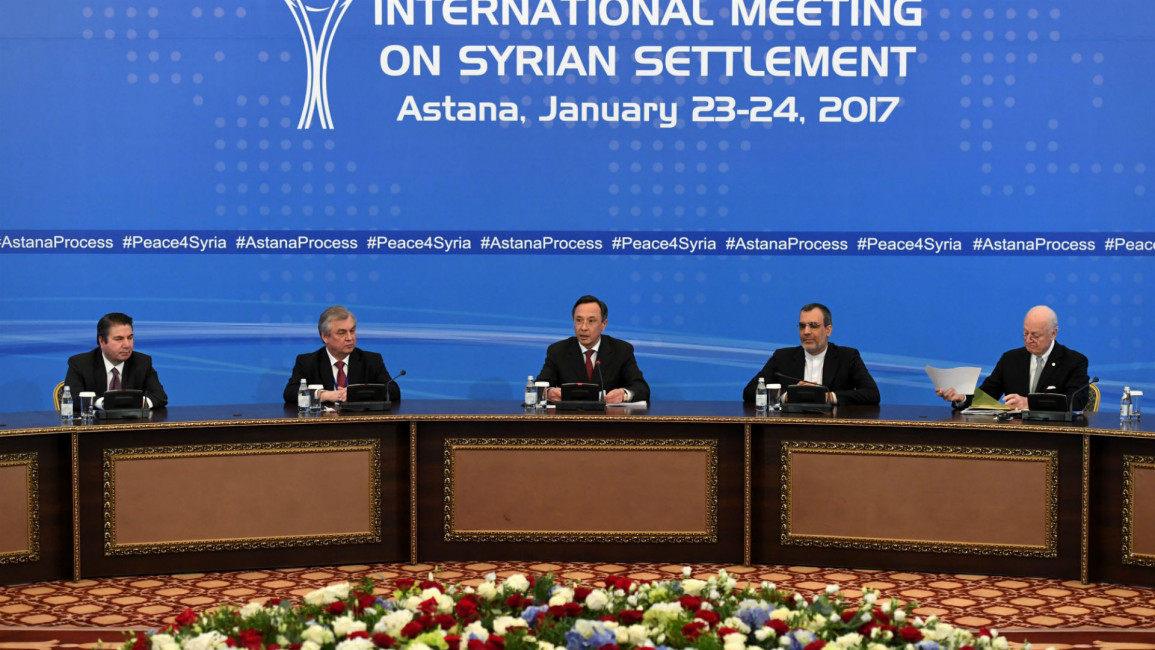Rehearsing for Geneva: Kazakhstan hosts 'model Syrian peace talks'
A new round of talks on the Syria conflict backed by Russia, Turkey and Iran and endorsed by the United Nations were going ahead Thursday after a day's delay, Kazakhstan has said.
A plenary session involving all three power-brokers and delegations from the Syrian government and opposition is scheduled to begin at 1600 local time (0900 GMT), a Kazakh foreign ministry official said at a press briefing in Astana Thursday.
On Wednesday, Kazakhstan said talks initially slated for 15 February had been moved to the next day for unspecified "technical reasons". However, rebel sources told The New Arab the delay was due to a Turkish-Russian disagreement over the agenda of the talks, particularly the Russian-proposed new constitution for Syria.
Bilateral consultations ahead of the plenary session are reported to have been underway since Wednesday.
Rebel spokesman Yehya al-Aridi told AFP on Wednesday the opposition was participating, but as a "smaller" delegation than the one it sent for the talks in Astana last month, when it refused to negotiate directly with Damascus.
The rebels, who initially cast doubt over their participation in the latest meeting will be led by Mohammad Alloush, a leading figure of the Army of Islam (Jaish al-Islam), he confirmed.
Rebel sources told The New Arab that this was to protest what they said was the Russian side's failure to fulfill its promises regarding lifting sieges and violations of the ceasefire, especially in Wadi Barada west of Damascus and the Eastern Ghouta.
 |
The first set of talks on Syria that took place in the Central Asian country's capital in January did not result in any significant breakthrough. |  |
Ceasefire first, politics second
The Syrian regime is represented in Astana by its ambassador to the UN, Bashar al-Jaafari.
| Syria's six-year-old war The Syrian conflict began when the Baath regime, in power since 1963 and led by President Bashar al-Assad, responded with military force to peaceful protests demanding democratic reforms during the Arab Spring wave of uprisings, triggering an armed rebellion fueled by mass defections from the Syrian army. According to independent monitors, hundreds of thousands of civilians have been killed in the war, mostly by the regime and its powerful allies, and millions have been displaced both inside and outside of Syria. The brutal tactics pursued mainly by the regime, which have included the use of chemical weapons, sieges, mass executions and torture against civilians have led to war crimes investigations |
He told Russian agency Ria Novosti on Wednesday that one-on-one meetings between the opposition and the government were "not planned".
The first set of talks on Syria that took place in the Central Asian country's capital in January did not result in any significant breakthrough.
The latest round of discussions will focus mostly on bolstering a faltering six-week truce with negotiations over any political settlement expected to wait for 23 February talks in Geneva.
Rebel spokesman Yehya Aridi told The New Arab that the talks "have one goal, to uphold the ceasefire". "Ending the carnage in Syria denies Bashar al-Assad and Iran their raison d'etre in the country," he added, casting doubt over their commitment to the cessation of hostilities, which the regime has been majorly violating in recent days and weeks across the country.
"There are not pre-conditions, but international resolutions that must be enforced," he added, explaining that any positive results at the talks on Thursday would help prepare for a political breakthrough ahead of the talks in Geneva.
Russia has sent presidential envoy Alexander Lavrentiev to the event while Iran dispatched deputy foreign minister Hossein Jaberi Ansari.
UN envoy on Syria Staffan de Mistura said he would not participate personally in the latest Astana meeting but that his office would be represented by a "technical team".
Russia and Iran have helped turn the tables on the ground in the war-torn country with their military backing for strongman Bashar al-Assad, while Turkey has supported rebels fighting to oust the strongman but has since shifted to support a ceasefire together with Russia and Iran.
Agencies contributed to this report



